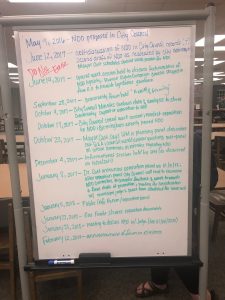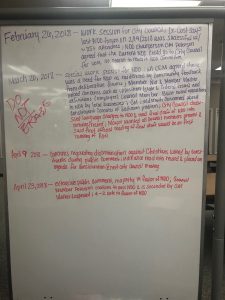Our purpose in analyzing the passage of the Montevallo Non-Discrimination Ordinance, an amendment to Article IV of Chapter 16 of Montevallo Municipal Code, is to examine the conflict which arose from the conception and inception of the amendment. By understanding the conflict regarding the Montevallo Non-Discrimination Ordinance, which expanded recognized minority groups protected against discrimination within the city of Montevallo, we can begin to understand the conflicts which can arise due to differences in belief and being within the small towns of Alabama.
In our unique community in the ‘Deep South’, establishing the rights of those within the LGBTQIA+ community was paramount. The city of Montevallo residents’ conflict and subsequent resolution could provide a striking example of the ability of ‘opposing’ groups to compromise and overcome differences for the sake of preserving the social culture of a community. Between the summer of 2016 and the spring of 2018, several community forums, panels, and discussions were held. These were highly facilitated and often took place in communal areas, such as the community library and campus buildings. During deliberation among members of our community, which at times was relatively heated, the non-discrimination ordinance, or NDO, became a point of contention in our very small town. Through this project, we hope to provide this real-life example as a blueprint to other small cities across the United States in their quests to make their communities more accepting and welcoming to people of all kinds.
On April 23rd, 2018, the amendment to Article IV of Chapter 16 of the City of Montevallo’s Municipal Code was approved in a 4-2 vote (Shelby County Reporter). After a two year struggle between progressive LGBTQIA+ groups and members of the community against more conservative and religious members of the community, the NDO became the second of it’s kind, an amendment to protect the rights of individuals regardless of sexual orientation or gender identity, in the state of Alabama. The only other city which already had a non-discrimination ordinance enacted was Birmingham, Alabama, with a staggering population of roughly 210,000 citizens. Meanwhile, Montevallo hosts roughly 6,500 citizens by comparison (U.S. Census Bureau).
The non-discrimination ordinance was first brought to the Montevallo City Council in early May of 2016 by an organization called Montevallo Acceptance Project, or MAP (Shelby County Reporter). We have reached out to this organization and have come into contact with a member of their steering committee who was directly involved in the creation of the NDO. The importance of this non-discrimination ordinance is to ensure and expand on the rights of those who have historically been disenfranchised. Montevallo is home to a diverse population that includes many members of the LGBTQIA+ community. Without the non-discrimination ordinance, the possibility of denial of certain rights to members of the LGBTQIA+ community still lingered. Establishing a non-discrimination ordinance with clear language and context was an important step in securing the safety and well being of LGBTQIA+ individuals in Montevallo.
While Montevallo is overall an accepting community, despite being in a highly conservative red state, the conflict over the non-discrimination ordinance and its existence demonstrates that even in the most liberal areas, there is resistance to change. The need for this particular analysis is not only to tell the story of Montevallo and uphold its reputation for being a welcoming and diverse town, but to possibly influence a chain reaction of assisting those who need these protections the most in communities beyond ours. Many of the people who participated and fought to have this non-discrimination ordinance established grew influential as the discussions continued. We believe that our analysis and project will show a valuable example for small communities who desire a positive change through persistent and effective rhetoric.
For the design of our website, first, we will incorporate a single page dedicated to the unique history of Montevallo. Since Montevallo has a rich and lengthy history, we want to showcase it’s evolution throughout time to allow people who are unfamiliar with this area to truly understand the eccentric culture surrounding it. On this same page, we will create a Timeline by KnightLab so that the viewer can see photos and text with historical information which we feel is pertinent to understanding the history of Montevallo. We will upload photos of the town, and possibly a Google My Maps to allow for navigation and a better understanding of the layout of the town. The size of Montevallo is an important component in understanding the way in which this non-discrimination ordinance was truly a community effort and a grassroots movement.
Secondly, we have reached out to interview a variety of community members, and will establish a single page structured for ease of use to our audience. These interviews will serve as both profiles of the individuals and their importance to our city, as well as provide valuable information about their participation and role in the creation, passage, or dissent of the non-discrimination ordinance. We hope these interviews will set the stage for our audience’s understanding of the necessity of a non-discrimination ordinance in Montevallo. Depending on the consent given by community members and officials, we may incorporate video and/or audio to make our interviews more concise and accessible.
Thirdly, we will incorporate a page dedicated to PDF access of the multiple versions of the non-discrimination ordinance, alongside explanations for how and why each draft was changed, and the important role that language played in the creation and conflict surrounding the final document. We hope to make these PDFs accessible to people with different needs through some technological integration which can make them easy to process through a screen reader. Explanations of the language will hopefully be influenced by our interviews with MAP (Montevallo Acceptance Project) members and their understanding of the language and the inherent problems which existed in multiple drafts. Alongside these PDF documents, we have reached out to City Hall in hopes of access to audio files or videos taken during City Hall meetings or other meetings where the ordinance was discussed. We have reached out to our school newspaper, The Alabamian, for information about relevant photographs which would enhance the experience for the audience.
Lastly, we will provide context for our audience on the resolution of the non-discrimination order. This is incredibly important to the story telling fashion in which we are hoping to present our project. Surely questions will arise among our audience as to whether the non-discrimination ordinance has made a significant or latent impact on our community. We hope to illustrate the importance of integrating minority members of our community into a social safety net which many of us had no idea we were privileged to, possibly through further interviews/follow-ups with our interviewees. With this, we will find ways to conclude this story in a meaningful and impactful manner, to leave our audience possibly with a call-to-action for change in many towns across the United States. The conclusion and resolution will be in their own page, allowing for users to click through from one section to the next and follow the story seamlessly.
Sources: https://www.shelbycountyreporter.com/2018/04/24/montevallo-passes-non-discrimination-ordinance/
https://www.census.gov/quickfacts/fact/table/birminghamcityalabama/IPE120217
https://www.census.gov/quickfacts/montevallocityalabama







